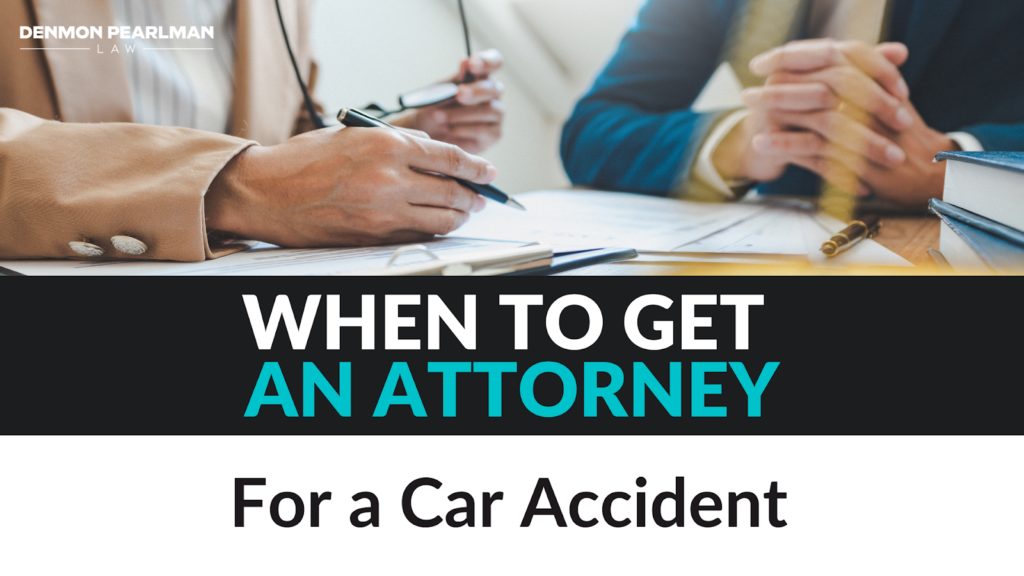
Knowing when to get an attorney for a car accident can save you time, money, and emotional distress. Whether you need to file a personal insurance claim or just a regular insurance claim, experienced attorneys can help even out the playing field and ensure accident victims’ rights to compensation are protected.
In the case of accident injuries and negligent drivers, the combined experience of a legal team of personal injury attorneys can help you receive maximum compensation for a physical injury, possibly even punitive damages. This can be especially important for a pedestrian accident or bicycle accident as severe injuries are more likely, even in a no-fault state. Brain injuries are another example of a major injury where legal counsel is strongly recommended.
Personal injury attorneys often work on a contingency fee basis, meaning accident victims only pay if they win their personal injury lawsuit. This is important for those who may think they lack the financial resources to hire personal injury attorneys or an auto accident lawyer.
An experienced car accident lawyer will understand the insurance industry and know how to combat common insurance company tactics during this difficult time, so you get the financial recovery you are owed. An experienced car accident attorney will help you through the legal claim process, whether a property damage claim or accident injury claim for injury victims.
How You Could Benefit From a Car Accident Lawyer
An auto accident attorney specializing in car accident claims will know the ins and outs of the legal process and be able to advise you on the best course of action at every point along the way. They can help you obtain the evidence you need, handle the paperwork and legal interactions, and ensure you get what you deserve as a result of the incident.
Getting a Car Accident Lawyer Can Increase your Compensation

Car accidents can be expensive and stressful events. They can even cause injury. If you are the victim of a car crash, or a collision, an attorney or personal injury lawyer can be instrumental in maximizing the compensation you are awarded from the responsible party. An auto accident lawyer is specially trained to know the fair compensation of your accident in terms of economic and non-economic damages. This can include property damage, medical expenses, and even punitive damages.
In most cases, an experienced lawyer will increase your compensation by far more than you can save by not working with one.
Handling Insurance Companies
Insurance companies are businesses that want to cut costs. The negligent party’s insurance company may try to reduce the amount they are required to pay you. Even your insurer may look for opportunities to reduce their financial obligation in the matter. Especially for big dollar cases, it is often cheaper for an insurance provider to lose a customer than be stuck with a big payout if they can avoid it.
A lawyer knows the rules and will fight for you on both fronts to ensure you receive the money you are owed for the incident.
Filing a Personal Injury Lawsuit
Filing a personal injury claim (or even a car accident lawsuit) can be time-consuming and complicated. You will likely have other things to worry about, like fixing your car or medical costs and recovery. Let personal injury attorneys who know how the legal process works handle the paperwork and use their expertise to help get you the optimal results.
Statute of Limitations in Florida
If you are going to file a lawsuit for a car accident in Florida, you should do so within four years of the event. The statute of limitations for personal injury cases and auto accidents are both four years. In the event of a wrongful death claim, legal action should be pursued within two years.
What to Provide Your Car Accident Lawyer
For your attorney to most effectively handle your case, they need as much information as possible. Be honest with them about what happened and provide the following documentation, if possible:
- A written statement of the event
- Video or photographs of the event or accident scenes
- Any witness statements you may have
- The police report for the event
- Auto insurance policies from both parties
- Pay stubs for missed work, if applicable
- Medical expense documentation, if applicable
Your lawyer may ask for other information, verbal or written, that can help your case. Collecting the above documentation for the initial consultation can help your attorney better understand the situation and come up with an effective plan early in the process.
If you have trouble acquiring any pertinent information, your lawyer may be able to help you retrieve it.
When to Call Your Car Accident Attorney
If you are wondering when to hire an attorney after a car accident that caused property damage or any amount of personal injury, you should call an auto accident lawyer as soon as you comfortably can. A lawyer can suggest which courses of action you should take to get the best results.

Our lawyers at Denmon Pearlman will give a free consultation for your car accident case, and we won’t charge anything unless we win.
FAQs
What should you not say after a car accident?
You need to be very careful what you say after being involved in a car accident. As with any legal matter, it is best to consult your attorney before making any statements, agreements, or conversing with authorities or the other party.
- For example, apologizing, even if you are not talking about the events that caused the accident, can be misconstrued as guilt and used against you in your case. An experienced car accident attorney will tell accident victims to avoid any such language, even if it only seems like minor damage.
- Do not agree to resolve the situation on your own. Even in a minor car accident, you should call the police, inform your insurance company, exchange insurance information with the other driver, and contact your attorney. Especially for accident victims where a personal injury claim is possible, be sure to contact your personal injury attorneys immediately.
- If the liable party’s attorney or insurance company attempts to contact you, refuse to give any statements or sign anything without your own lawyer’s approval. They may be looking for a quick settlement. The biggest insurance carriers have a track record of using their massive resources and aggressive insurance adjusters to avoid paying adequate compensation after an automobile crash. A personal injury law firm will help you get maximum compensation, regardless of so-called policy limits or contingency fees.
- You should also avoid making any statements or posting any evidence publicly, such as on social media or in everyday life, as anything you say can be used against you in court in bad faith.
- If you suffer injuries in an accident, do not refuse medical attention. If a police officer or other first responder offers to provide medical care, let them. If you are not examined at the scene of the accident, visit a hospital or your physician as soon as you can, even if you think you are uninjured. You may have sustained injuries that aren’t apparent right away but present themselves later on. Finding them as early as possible and having medical records is vital for receiving a fair settlement.
Your attorney may have other guidance on what to do or not do regarding the incident, so follow their professional advice for the best results.
What should you not say to your insurance company after an accident?
You should also be careful what you say to your insurance company after an accident. Even though they are on your side, auto insurance companies may still want to minimize the insurance settlement, as underinsured motorist coverage for the at-fault drivers may leave your insurance representatives responsible for the additional cost.
The same is true if the liable party is an uninsured driver. If the other party is found not responsible or unable to pay you the amount you are owed, some of that burden may fall to your insurer, depending on your insurance coverage.
Avoid saying the following when communicating with your insurance company:
- Opinions may be used to downplay the actual events or twist your perception of what occurred. Avoid saying “I’m not sure” or, “I think” something did or did not happen. Stick to the facts and avoid answering tricky questions or anything you are uncertain about, or you may face insurance issues.
- Admission of guilt, even if you believe it to be true, will not help your case in any way, shape, or form. You don’t have to lie or blame the other driver, but avoid saying things like “I shouldn’t have changed lanes” or “I’m sorry,” as this may be misconstrued as admitting fault, which can hurt your chances of receiving due compensation. You may even think you were at fault, and turn out not to be, so be careful not to make a statement of guilt prematurely.
- Do not make statements about injury; leave that to the medical professionals. Even a casual “are you okay?” can lead to an inappropriate response. Saying “I’m okay” or “only minor injuries” to your insurance company can give them grounds to deny any injury coverage that may come to light after further examination.
- Don’t make any agreements or sign anything without first consulting an attorney. A motor vehicle accident can be overwhelming and chaotic. An insurer may make you an offer that seems reasonable or simpler than hiring a lawyer, but such offers are in the insurance company’s best interest, not yours. Talk to your lawyer first.
- You should not admit to not having an attorney. Legal consultation provides invaluable support in recovering the compensation you may be owed from your insurance company as the result of an accident. Admitting you don’t have one may embolden your insurer to pressure you to settle for less than you deserve. Even if you don’t have an attorney, you can get one.
In general, avoid giving any unnecessary details or statements to your insurance company (or anyone else). Any statements you give, specially recorded ones, can be used against you. Do not share information about other people involved, such as passengers, family members, or your doctor, that the insurance company may attempt to contact for statements. Do not give unnecessary details about the event, such as how fast you were driving or weather conditions. Do not try to diagnose your injuries, such as saying you have “whiplash,” or there was “minor damage,” or it was only a “minor car crash.” Stay on a need-to-know basis and stick to the facts unless advised otherwise by your attorney.
When should you admit a car accident?
There is no reason to admit fault for a car accident, even if you believe that you caused it. This will not negatively impact the other party or help you in any way.
You should work with your lawyer and avoid making statements to anyone else. Stick to the relevant facts and advice of your lawyer, and avoid giving opinions or judgments about what happened.
Admitting guilt could make it impossible to recover the compensation you are owed from the other party or your own insurance company and may be used against you. It is not your obligation to determine whose fault it was; leave that to the insurance adjusters. If you have any questions, this is when to get an attorney for a car accident.
